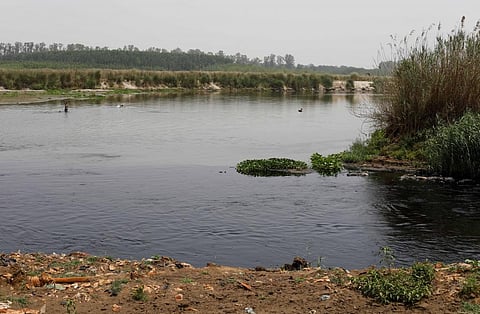

A small hamlet in Punjab’s Fazilka district, Burj Mohar, has 60-70 families but has seen more than its fair share of tragedies. Around 30 deaths due to cancer have been reported there over the last decade and mysterious illnesses affect people of all age groups — linked to industrial effluents polluting the residents’ water sources.
Parminder Singh is one villager who recently faced a loss. His mother, Baldev Kaur (75), died due to blood cancer two days after being diagnosed.
Down To Earth (DTE) visited the village and found the neighbours gathered at Parminder’s house, mourning his loss. “My mother was diagnosed with blood cancer five days ago and died two days later. Her cancer was at an advanced stage,” Parminder told DTE.
Parminder Singh (second from right) morning the loss of his mother, Baldev Kaur, to blood cancer. Photo: Vikas Choudhary / CSE
Kaur was unconscious the whole time. She was taken to Balaji Hospital, a private hospital in Abhoar, a city in the Fazilka district. There is no government hospital in the village.
Some 29 people have died due to cancer in the village in the last 10-12 years, according to Kuldeep Singh, a 61-year-old farmer and a resident of the village.
The high burden of cancers has been linked to water pollution. The villagers have access to two sources of water: Groundwater and canal water. Water from the Sutlej river enters the Abohar branch of the Sirhind canal, which reaches southwest Punjab, including the Fazilka district.
The village earlier received water from Bhakra Nangal Dam, said Jagdeep Singh, who served as the village Sarpanch from 1998-2011. Jagdeep has developed issues in his spinal discs.
“Around 50 years ago, we stopped receiving water from the dam. Our problems began when we became dependent on Sutlej water,” he noted.
The canal water is polluted due to Buddha nullah, a 40-kilometre-long stream that passes through Ludhiana city before merging with the Sutlej river in the Ludhiana district.
Effluents from industries in the region and municipal waste gets dumped into the nullah, which has turned black and has a nauseating odour. Several studies have documented the presence of heavy metals in the stream.
“Ten years ago, we used canal water for drinking water purposes. But now, it is too dirty. We use it only for irrigation,” Kuldeep said.
Heavy metals such as chromium, nickel, arsenic and mercury are linked to cancer, according to a 2022 study. These hazardous elements can also damage the functioning of the brain, lungs, kidney, liver, blood composition and other important organs.
The Punjab Pollution Control Board (PPCB) has graded the water quality of the Sutlej river as Class C (drinking water sources with conventional treatment followed by disinfection) before it merges with Buddha nullah.
But after the two water bodies meet, the grade drops to Class E, which is suitable for irrigation, industrial cooling and but not for drinking purposes. The residents of Burj Mohar use groundwater for drinking. But the water is also contaminated and unfit for consumption.
“Companies providing water filtration services have told us that the total dissolved solids (TDS) level in the groundwater is higher than the permissible limit of 500 milligramme per litre,” Kuldeep said.
TDS represents dissolved organic matter and inorganic salts, including sodium, potassium, calcium, magnesium, chloride, bicarbonates and sulphates.
The village has a common reverse osmosis (RO) system installed some 10 years ago, but it is permanently in a state of disrepair. Parminder and Kuldeep have installed an RO system in their house, but many others, like Jaskaran Singh (40), cannot afford one.
Jaskaran used to be a mechanic. But suddenly, in 2018, he lost the ability to walk. He is paralysed from the waist down. He has consulted multiple doctors in Ludhiana, Jaipur, Delhi and Bikaner but has not received any definitive diagnosis.
After shelling out around Rs 10-12 lakh, Jaskaran has now given up hope and stopped all medical treatments. His wife runs a grocery store to make ends meet and his 17-year-old son works as a labourer.
Most members of Kuldeep’s family are also battling different ailments. He has a heart condition and a stent was placed in his chest two years ago. His wife, Pushpinder Kaur, was diagnosed with breast cancer in 2017 and is currently undergoing treatment. The couple’s son, Tijinder Singh, has a speech disability.
Read more: Caution over cleanup of Nura river
“You will find patients in almost every house,” Kuldeep said. The residents have issues with digestion, liver problems, and joint pains. “People aged 50 and above have trouble getting up,” he added.
Makhan Singh (66) has been experiencing joint pain for the last two years. He was asked to get knee replacement surgery. “I don’t have money for it. All the money we make goes into farming or medication,” he explained.
This story is part of a series on the health problems faced by people of Punjab due to pollution.